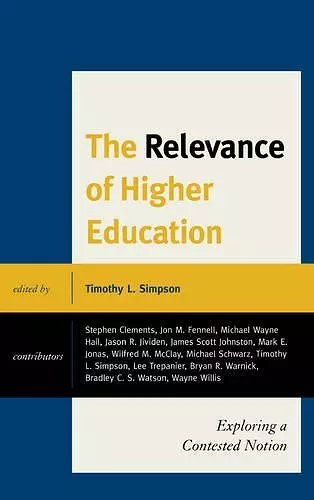The Relevance of Higher Education
Exploring a Contested Notion
Format:Paperback
Publisher:Bloomsbury Publishing PLC
Published:20th Oct '15
Currently unavailable, and unfortunately no date known when it will be back
This paperback is available in another edition too:
- Hardback£102.00was £102.00(9780739182529)

Most statements today about higher education begin with the assumption that it should be relevant. That it should be relevant, however, does not settle the matter. The significance of relevance depends on the power of something else that is more fundamental. Relevance may be a true standard of judgment, but it does not stand by itself. Assuming higher education should be relevant, the question emerges, relevant to what? Why? How? At what costs? And, relevant in what sense? These are some of the central questions animating this study.
The Relevance of Higher Education: Exploring a Contested Notion, edited by Timothy L. Simpson examines the relevance of higher education by bringing together the work of historians, political scientists, and educational philosophers. The contributors probe the meaning of relevance in its many guises, providing an historical and philosophical account of the roots of this concept and its impact on the institution of higher education. Furthermore, The Relevance of Higher Education provides a critical evaluation of the impact of relevance on our understanding of the political and economic relationship between higher education and society. This study suggests views of relevance that could guide the future of higher education. By providing penetrating analysis, this text thoroughly explores relevance and its underlying assumptions, potential implications and long-lasting effects on higher education and society. The Relevance of Higher Education provides the tools necessary to develop a rich framework for understanding relevance and its impact on higher education and society.
The Relevance of Higher Education: Exploring a Contested Notion. . . .pushes back against the narrow, market-oriented notion of relevance that dominates higher education policy today. Arguing overall that higher education’s most noble calling is to form individuals, cultivate their characters, and shape their souls, contributors to The Relevance of Higher Education are critical of the larger consumer society, which increasingly pressures colleges and universities to serve its immediate needs for expertise, employees, leaders, and problem-solvers. * Change: The Magazine of Higher Learning *
With the university under constant calls to justify its costs and prove its relevance, this volume of essays couldn’t be more timely. Here we have sober reflections on the liberal arts in an age of productivity, assessment, career readiness, and political correctness, each trend threatening in one way or another the cardinal ideals of higher education. Some of the contributors proceed historically, others ethically and philosophically; they invoke Aristotle, Tocqueville, Nietzsche, Dewey, David Rieseman, and Allan Bloom; they range from the highs of liberal education for its own sake to the lows of university marketing strategies; and they expose relevance as a flexible and tactical concept, both an engine of curriculum, a social validation, and a burden of public financing. People confounded by amazing developments such as the labeling of students as 'customers' and data on how little students typically learn during their undergraduate career will find them explained in these pages. Indeed, as the debates over the value and purpose of higher education move forward in the coming years, participants will prosper by assimilating the contents of this volume. -- Mark Bauerlein, author of The Dumbest Generation: How the Digital Age Stupefies Young Americans and Jeopardizes Our Future
The Relevance of Higher Education is a thought-provoking and highly-readable text that will challenge anyone who proclaims to have the 'final word' on the purpose of universities today. I encourage anyone who cares about the future of higher education to read this text carefully and learn from the impressive collection of authors, from a wide variety of fields, who contributed to it. -- Wesley Null, Baylor University
ISBN: 9781498525893
Dimensions: 231mm x 151mm x 18mm
Weight: 376g
256 pages